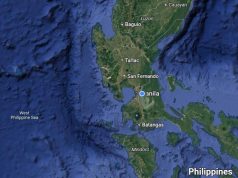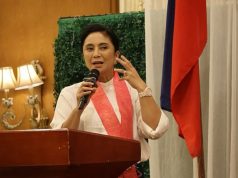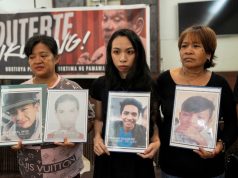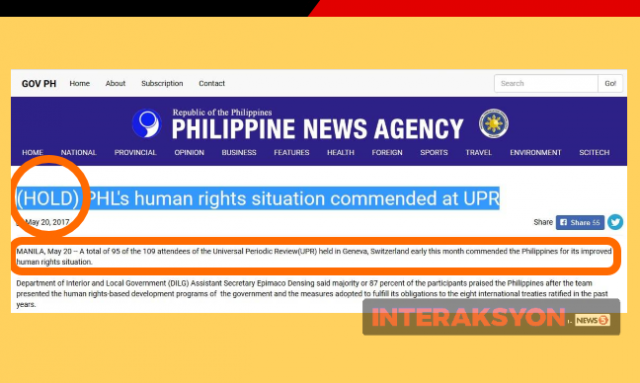
MANILA, Philippines – President Rodrigo Duterte has seldom bothered to hide his scorn for what the mainstream media, which he has repeatedly accused of committing unfair reportage about him and his administration.
This had been a mantra picked up by his defenders and supporters, and often used as justification to advocate for “alternative” news sources, including those that have been found to purvey patently false information, either for the administration or against its perceived foes.
This week, however, it was the state-run Philippine News Agency’s turn in the limelight for spreading fake news when it posted – not once, but twice – separate but almost identical stories about how United Nations member-states supposedly reacted favorably to the Universal Periodic Review in Geneva earlier this month, at which the Philippines’ human rights record was scrutinized.
The first story, dated May 15, and titled “95 nations in 3rd UPR convinced no EJKs in PHL,” led off thus:
Ninety-five out of 105 countries that attended the Universal Periodic Review (UPR) in Geneva, Switzerland were convinced that extra judicial killings (EJK) is non-existent in the Philippines.
DILG Assistant Sec. Epimaco Densing, in a press conference on Monday, said the Philippines received congratulatory messages noting that this is the first time they heard that the figures reaching them were “spoiled and rotten information.”
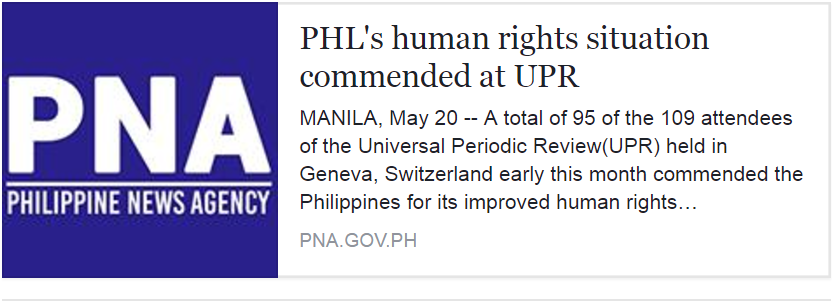
That news item is no longer live on the PNA web site.
The second, dated May 20, was titled “PHL’s human rights situation commended at UPR,” and said:
A total of 95 of the 109 attendees of the Universal Periodic Review(UPR) held in Geneva, Switzerland early this month commended the Philippines for its improved human rights situation.
This time, DILG’s Assistant Secretary Densing said the majority, or 87 percent of the participants, praised the Philippines after the team presented the human rights-based development programs of the government and the measures adopted to fulfill its obligations to the eight international treaties ratified in the past years.
In the May 15 article, Densing was quoted as blaming local media for the bad reputation the country is getting over the thousands of drug war killings:
Asked who supplied distorted facts and figures to international human rights organizations, Densing said they picked up the reports from local media.
He asserted that the government has already explained that the total number of killings pertains to the summary of ALL the cases including homicide and murder cases.
“The problem is we give the facts and figures but local media is not reporting our side,” Densing pointed out.
However, earlier reporting by both local and international media soon after the UPR – where soon to be Foreign Affairs Secretary Alan Peter Cayetano famously dismissed reports on the drug war deaths as “alternative facts” – painted a different reality than that which Densing claimed, through the two articles, the world saw.
InterAksyon was among the first to report on the recommendations, “LOOK | Draft UN rights recommendations to PH: Stop EJKs, capital punishment, etc” (http://media.interaksyon.com/read-ph-urged-to-end-drug-war-ejks-nix-return-of-death-penalty/), on May 11, based on a draft released by the United Nations Information Center in Manila.
UN recommendations
As early as then, the recommendations clearly showed which issues most concerned the other UN member-states, such as this sampling:
- Ensure that all counter-narcotics operations are conducted in conformity with constitutional protections and international human rights obligations (United States of America)
- Provide adequate resourcing to the Commission on Human Rights and allow it to investigate alleged extrajudicial killings (Australia)
- End extrajudicial killings, enforced disappearances, illegal arrests and detention, torture and harassment, including by effectively implementing criminal prohibitions against extrajudicial killings (Canada)
- Respect the right to life and maintain the abolition of the death penalty (Haiti)
- Consider not reinstating the death penalty, as per the bill introduced before the 17th Congress (Mozambique)
Reuters reported later that same day (http://www.reuters.com/article/us-philippines-un-idUSKBN1872N4) that the UN Human Rights Council had adopted the report on the Philippines “comprising 257 recommendations from 95 states, roughly half voicing concern over the killings, and told the Philippines to report back ‘with a clear position’ at its September session.”
Reuters quoted UNHRC spokesman Rolando Gomez as saying: “The international community sent out a very strong message to the Philippines government today … Many of the recommendations did address the extrajudicial killings, arbitrary detentions vis-a-vis the government’s campaign to stamp out illegal drugs.”
Gomez also noted that nearly 50 states had voiced concerns, “so that obviously speaks volumes, and now of course it is up to the government to make good on the promises that they committed to here.”
And even China, which during the debate congratulated Duterte’s administration on its “remarkable achievements” in protecting human rights, suggested in its recommendation that it should “address the root cause of illegal drugs through development,” Reuters reported.
In the ABOUT US section of its web site, it is stated that PHILIPPINE NEWS AGENCY (PNA) is a web-based newswire service of the Philippine government under the supervision and control of the Presidential Communications Office (PCO).




